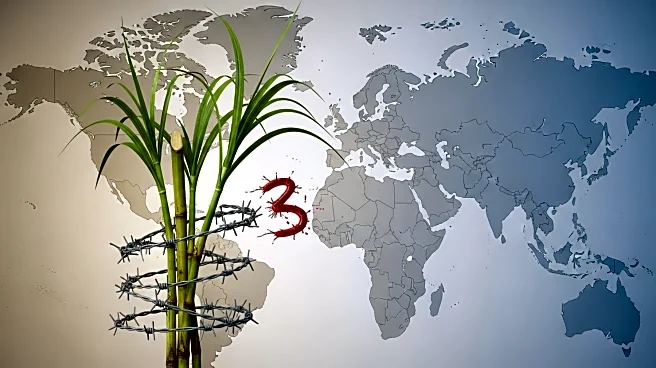What's Happening?
The United States has imposed a 30% tariff on imports of South African sugar, significantly impacting the country's sugar industry. This tariff, implemented under President Trump's administration, replaces a previously favorable tariff rate quota (TRQ) that allowed South African sugarcane growers and millers to export 24,000 tonnes of sugar annually to the US. The new tariff has narrowed the price margin for South African sugar exports, making them less competitive compared to other countries like Brazil and Mexico, which face lower tariffs. The South African Sugar Association and other industry stakeholders are advocating for negotiations to reduce or eliminate the tariff, as the current situation threatens to cost the industry approximately R170 million in revenue annually.
Why It's Important?
The imposition of the 30% tariff on South African sugar exports to the US has significant economic implications for the South African sugar industry. The tariff not only reduces the competitiveness of South African sugar in the US market but also exacerbates the financial challenges faced by the industry, which is already dealing with a surge of subsidized sugar imports domestically. The loss of revenue could have a ripple effect on the livelihoods of sugarcane growers and millers, potentially leading to job losses and economic instability in regions dependent on sugar production. The situation highlights the broader impact of international trade policies on local industries and the importance of strategic negotiations to protect economic interests.
What's Next?
Industry leaders in South Africa are hopeful that ongoing negotiations between the US and South African governments will lead to a reduction or elimination of the tariff. In the meantime, the South African sugar industry is exploring alternative export markets and investing in diversifying its product offerings to mitigate the impact of the tariff. The South African Sugarcane Growers' Association has also relaunched a campaign to encourage domestic consumers to purchase locally produced sugar, aiming to bolster the local market and reduce reliance on exports.
Beyond the Headlines
The tariff issue underscores the complexities of global trade and the challenges faced by industries in developing countries when competing against subsidized products from larger economies. It also raises questions about the fairness of trade practices and the need for international cooperation to ensure equitable market access. The situation may prompt South Africa to reassess its trade strategies and seek alliances with other countries facing similar challenges.











